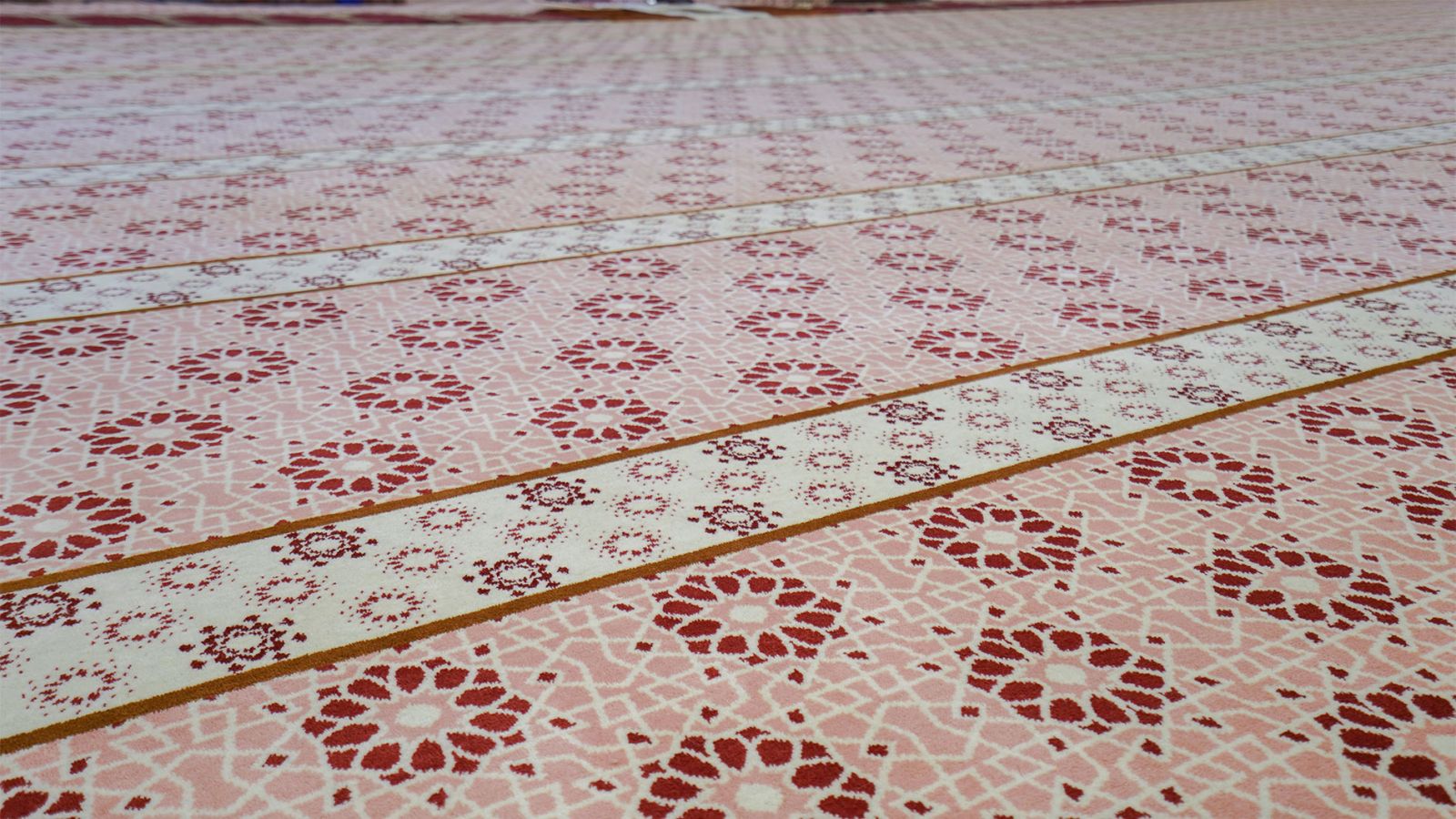O Muslims! Fear Allāh and hold onto this religion by way of which happiness, serenity and success is achieved. Know that this is not achievable unless one clings to the Book of Allāh, the Sunnah of His Messenger (ṣallallāhu ʿalayhi wa-sallam) upon the understanding of his noble Companions (raḍi Allāhu ʿʿʿanhum ajmaʿīn). Whilst holding firmly, one should be aware of the plots made by the enemies of al-Islām against this blessed dīn seeking to destroy the dīn from within, in the name of the dīn. How do they seek to destroy the dīn from within? By introducing affairs into this religion which have no textual basis or legislation for it, believing that they are doing something good.
Allāh and His Messenger warned against these innovations and newly invented matters and made clear the description and characteristics of the innovators so that we can be aware of them. The Proof for this is in the saying of Allāh (ʿazza wa jal),
ٱتَّبِعُواْ مَآ أُنزِلَ إِلَيۡكُم مِّن رَّبِّكُمۡ وَلَا تَتَّبِعُواْ مِن دُونِهِۦۤ أَوۡلِيَآءَۗ قَلِيلاً۬ مَّا تَذَكَّرُونَ
“[Say (O Muḥammad) to these idolaters (pagan Arabs) of your folk] Follow what has been sent down unto you from your Lord (the Qurʾān and Prophet Muḥammad’s Sunnah), and follow not any Auliyāʾ (protectors and helpers who order you to associate partners in worship with Allāh), besides Him (Allāh). Little do you remember!”
[Sūrah al-Aʿrāf, 7:3]
He (subḥānahu wa ta’āla) also said,
وَٱتَّبِعُوٓاْ أَحۡسَنَ مَآ أُنزِلَ إِلَيۡكُم مِّن رَّبِّڪُم مِّن قَبۡلِ أَن يَأۡتِيَڪُمُ ٱلۡعَذَابُ بَغۡتَةً۬ وَأَنتُمۡ لَا تَشۡعُرُونَ
“And follow the best of that which is sent down to you from your Lord (i.e. this Qurʿān, do what it orders you to do and keep away from what it forbids), before the torment comes on you suddenly while you perceive not!”
[Sūrah al-Zumar, 39:55]
And also in Sūrah al-Baqarah,
فَإِمَّا يَأۡتِيَنَّكُم مِّنِّى هُدً۬ى فَمَن تَبِعَ هُدَاىَ فَلَا خَوۡفٌ عَلَيۡہِمۡ وَلَا هُمۡ يَحۡزَنُونَ
“…Then whenever there comes to you Guidance from Me, and whoever follows My Guidance, there shall be no fear on them, nor shall they grieve.”
[Sūrah al-Baqarah, 2:38]
The Noble Prophet Muḥammad (ṣallallāhu ʿalayhi wa-sallam) has left within his prophetic tradition a guidance for his Ummah through which none will go astray if they cling to it firmly, he (ṣallallāhu ʿalayhi wa-sallam) said,
“I am leaving you two things and you will never go astray as long as you cling to them, they are the Book of Allāh and my Sunnah.” [Reported by al-Hākim – Ṣaḥīḥ.]
As an extreme warning from staying away from innovations and its people, the Prophet (ṣallallāhu ʿalayhi wa-sallam) would always begin his sermons with this reminder to his noble Companions, in a time when there was no innovation present, and as a reminder to the people who were from the best of mankind,
“Every innovation is misguidance and going astray” [Reported by Abū Dāwūd (no. 4607), al-Tirmidhī (no. 2676) and it is ṣaḥīḥ. Ibn Ḥajar authenticated it ‘Takhrīj Ahādīth Ibn al-Hājib’ (1/137)].
And he also said,
“… and every innovation is misguidance and all misguidance is in the Hellfire.” [Reported by al-Nasāʾī (1/224) from Jābir ibn ʿAbdullāh and it is ṣaḥīḥ as declared by Shaykh al-Islām Ibn Taymīyyah in Majmūʿ al-Fatāwá́. (3/58)]
And in the ḥadīth of Irbād Ibn Sāriyah, may Allāh The Most High, be pleased with him, who said,
“The Messenger of Allāh (ṣallallāhu ʿalayhi wa-sallam) gave us a sermon which frightened the hearts and caused the eyes to shed tears. So we said, ‘O Messenger of Allāh! It is as if it is a [farewell sermon] so advise us.’ He said,
‘I advise you to fear Allāh and to hear and obey even if an Abyssinian slave were to rule over you. For surely, he who lives from amongst you will see much differing, so it is upon you to be upon my Sunnah and the Sunnah of the Rightly Guided Caliphs. Biteon to it with your back molar teeth and beware of newly invented matters, for verily, every newly invented matter is an innovation, and all innovation is misguidance.” [Related by Abū Dāwūd (no. 4607) and by al-Tirmidhī (no. 2676). It was authenticated by Shaykh Ṣāliḥ in Irwāʿ al-Ghalīl (no. 2455)]
Within these texts, is the clear command to follow the Book of Allāh and the Sunnah of His Messenger (ṣallallāhu ʿalayhi wa-sallam) and shows the clear prohibition of innovating in the religion and the evil of innovators.
Linguistically bidʿah (innovation) means ‘a newly invented matter’. The Sharīʿah definition of bidʿah is: “A newly invented way [beliefs or action] in the religion, in imitation of the Sharīʿah (prescribed Law), by which nearness to Allāh is sought, [but] not being supported by any authentic proof – neither in its foundations, nor in the manner in which it is performed.” [Al-Iʿtisām of al-Shāṭibī (1/37)]1
As for those things which are invented things related to worldly affairs, then they are permissible in the aṣl (principle) for example the usage of mobile phones, cars, and so on. These are things that relate to worldy affairs and are not from the dīn and thus are considered mubāh unless they cause harm or are used for that which is not permissible.
Bidʿah (innovations) can be categorised into two; bidʿah in the statement with regards to belief, such as the bidʿah of the Jaḥmīyyah, Muʿtazilah2 and the Rāfiḍah, and other such sects which deviated in belief; and then there is bidʿah in actions, for example, the worshipping of Allāh in a matter which has not been legislated, this is not permissible because the principles of worship are tawqīfiyyah – it is what is present in the Book of Allāh and the Sunnah of His Messenger (ṣallallāhu ʿalayhi wa-sallam). This category can be placed into subdivisions. Firstly, bidʿah in the essence of ʿibādah, such as those who innovate an act of worship which has not been legislated, for example, the celebration of birthdays whether of prophets or saints.3
Secondly, innovations in the acts of worship, for instance, something which has been added to an existing act of worship, like one who prays four rakaʿāt for Maghrib ṣalāh.
The third kind is innovation in how the act of worship should be performed. So this individual didn’t add anything, but instead changed the way in which the act of worship should be performed, for instance, the adhkār legislated after the ṣalawāt is performed in a way not legislated like communal dhikr4 in a group, like the Ṣūfis and Brelwīs; or they do not pray in the manner in which the Prophet prayed, but rather performed it in a way not prescribed and in opposition to that which has been legislated. The fourth falls into the timing the act of worship is performed, for example singling out the 15th of Shaʿbān5 with praying qiyām and fasting. This is something which a particular day should not be singled out for, rather the Messenger of Allāh was constant in performing the qiyām prayer, and legislated optional fasts on particular days for which there are strong authentic textual proofs for.
The ruling of innovation in the dīn is that all of its types are impermissible and fall into misguidance, due to the Prophet’s stern warning regarding every innovation being a misguidance. Whoever claims or thinks there is a good innovation is wrong in his claim and he goes against that which is present in the ḥadīth of the noble Prophet (ṣallallāhu ʿalayhi wa-sallam).
From those innovative practices which are considered kufr are performing ṭawāf around graves in order to seek nearness to its inhabitants, or slaughtering and making vows for the dead in the graves. And from those innovations which are from the asbāb (means) which lead to disbelief are the actions of making the graves high and praying towards the graves and supplicating to the graves, or celebrating birthdays of prophets and others.
From those innovations which are considered heresy in belief, are those beliefs present in the madhab of Khawārij, the Murjīʿah and the Qadarīyyah; and from those innovations which are considered disobedience to the command of the legislator but does not amount to heresy or disbelief, are for example those who go to extreme in the length of worship, and perform it for longer than it has been prescribed in legislation. Like praying all night without sleep, or the one who says he will not marry women or the one who refuses to eat meat or the purified means of sustenance provided by Allāh.
This is something which is considered extreme, as Anas ibn Mālik (raḍi Allāhu ʿanhu) narrated:
A group of three men came to the houses of the wives of the Prophet asking how the Prophet worshipped (Allāh), and when they were informed about that, they considered their worship insufficient and said, “Where are we from the Prophet as his past and future sins have been forgiven.” Then one of them said, “I will offer the prayer throughout the night forever.” The other said, “I will fast throughout the year and will not break my fast.” The third said, “I will keep away from the women and will not marry forever.” Allāh’s Messenger came to them and said, “Are you the same people who said so-and so? By Allāh, I am more submissive to Allāh and more afraid of Him than you; yet I fast and break my fast, I do sleep and I also marry women. So he who does not follow my tradition in religion, is not from me (not one of my followers).” [Ṣaḥīḥ al-Bukhārī, The Book of Marriage, No. 4731]
O Muslims! Verily innovation in an evil which takes people away from Allāh and the correct religion, and it is an innovation that has no benefit, a clear evil. Innovation is more beloved to shayṭān than sin, because the one who sins recognises that he has committed a sin and feels remorse which draws him to repent; but the mubtadiʿ thinks he is right and better than others and does not make tawbah for his innovation, furthermore, the mubtadiʿ has legislated something in the religion of Allāh which Allāh has not legislated, and indeed, legislation is for Allāh alone! He goes against Allāh and His Messenger even if he has good intentions. Good intentions are not an excuse for going against the Book of Allāh and the Sunnah, Allāh says,
وَمَن يَعۡشُ عَن ذِكۡرِ ٱلرَّحۡمَـٰنِ نُقَيِّضۡ لَهُ ۥ شَيۡطَـٰنً۬ا فَهُوَ لَهُ ۥ قَرِينٌ۬ (٣٦) وَإِنَّہُمۡ لَيَصُدُّونَہُمۡ عَنِ ٱلسَّبِيلِ وَيَحۡسَبُونَ أَنَّہُم مُّهۡتَدُونَ
“And whosoever turns away blindly from the remembrance of the Most Gracious (Allāh) (i.e. this Qurʾān and worship of Allāh), We appoint for him Shayṭān (Satan devil) to be a Qarīn (a intimate companion) to him. And verily, they (Satans / devils) hinder them from the Path (of Allāh), but they think that they are guided aright!”
[Sūrah al-Zukhruf, 43:36-37]
And He (ʿazza wa jal) also says,
قُلۡ هَلۡ نُنَبِّئُكُم بِٱلۡأَخۡسَرِينَ أَعۡمَـٰلاً (١٠٣) ٱلَّذِينَ ضَلَّ سَعۡيُہُمۡ فِى ٱلۡحَيَوٰةِ ٱلدُّنۡيَا وَهُمۡ يَحۡسَبُونَ أَنَّہُمۡ يُحۡسِنُونَ صُنۡعًا
“Say (O Muḥammad): “Shall We tell you the greatest losers in respect of (their) deeds? “Those whose efforts have been wasted in this life while they thought that they were acquiring good by their deeds!’
[Sūrah al-Kahf, 18:103-104]
Indeed, here is a ḥadīth which should be paid attention to, it is in the narration of Hudhayfah ibn al-Yamān (raḍi Allāhu ʿanhu). He said:
People used to ask the Messenger of Allāh (sāllAllāhu ʿalayhi wa-sallam) about the good times, but I used to ask him about bad times fearing lest they overtake me. I said: Messenger of Allāh, we were in the midst of ignorance and evil, and then Allāh brought us this good (time through Islām). Is there any bad time after this good one?
He said: Yes. I asked: Will there be a good time again after that bad time? He said: Yes, but therein will be a hidden evil. I asked: What will be the evil hidden therein? He said: (That time will witness the rise of) the people who will adopt ways other than mine and seek guidance other than mine. You will know (their) good points as well as (their) bad points. I asked: Will there be a bad time after this good one?
He said: Yes. (A time will come) when there will be people standing and inviting at the gates of Hell. Whosoever responds to their call they will throw them into the fire. I said: Messenger of Allāh, describe them for us.
He said: They will be a people having the same complexion as ours and speaking our language. I said: Messenger of Allāh, what do you suggest if I happen to live in that time? He said: You should stick to the main body of the Muslims and their leader. I said: If they have no (such thing as the) main body and have no leader? He said: Separate yourself from all these factions, though you may have to eat the roots of trees (in a jungle) until death comes to you and you are in this state. [Collected by al-Bukhāri and Muslim. The wording of the above is that of Imām Muslim]
Endnotes:
1 ‘Innovations and Innovators : The Stance of the Muslim Who Cares for His Religion’
2‘A Historical Outline of the Dīn of the Jahmites, Muʿtazilah, Kullābīyyah, Karrāmīyyah, and the Early and Later Ashʿarīs on Allāh’s ʿUlūww and Istawāʾ
3‘Refuting the Claim that Celebrating the Mawlid is Good Bidʿah’
4‘Ruling on Reciting Dhikr Audibly After the Obligatory al-Ṣalāh in Unison’
5‘Ruling on Celebrating Specific Occasions, the Night of Isrāʾ and Middle of Shaʿbān’













